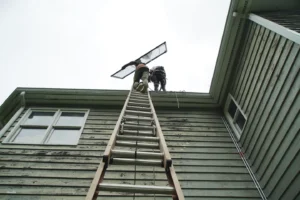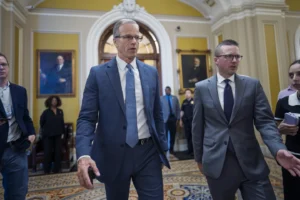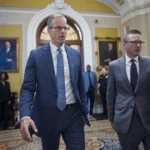Despite International Tensions, Wyoming Jews Feel Secure… For Now
As the war in Israel and Gaza persists, Jewish leaders say ‘there’s a lot of grief,’ but feel ‘very supported’ by Wyoming community
- Published In: Politics
- Last Updated: Dec 03, 2023
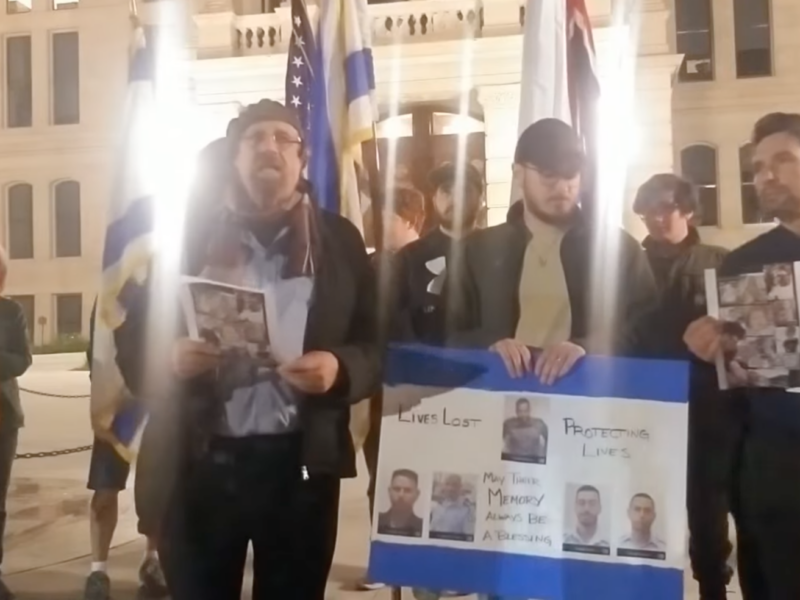
Religious leaders and community members participated in an "interfaith vigil" for Israel at the state capitol in Cheyenne on Oct. 9. (Photo via YouTube / Mt. Sinai Congregation)
By Jacob Gardenswartz
Special to the Wyoming Truth
When Jackie Zalcman told her friends at home on Long Island, New York, that she’d be attending the University of Wyoming, their responses were ubiquitous.
“The biggest question I got asked senior year of high school was like, ‘What are you going to do? There’s like negative-five Jews in Wyoming,’” Zalcman recalled. “‘How are you going to live there? How are you going to survive?’”
Now a 22-year-old senior physics major, Zalcman told the Wyoming Truth she was “confident” enough in her Judaism not to worry much about moving to Wyoming. And since the recent outbreak of violence in Israel and Gaza has sparked concerns about upticks in antisemitism and Islamophobia on college campuses, Zalcman’s family is especially grateful for her decision to attend school in the Equality State.
“At one point, my mom texted me and she’s like, ‘I’m so happy you’re in Wyoming,’” Zalcman said. “‘Like, no one knows anything, nothing is going on. If you were home, it would just be another thing I’d have to worry about.’”
Since the Palestinian militant group Hamas’ Oct. 7 attack on Israel and the Jewish nation’s subsequent military siege of Gaza, Jews and Arabs alike have faced increased tensions and targeted violence around the world.
In the Middle East, about 1,200 Israelis were killed in the initial attack, over 250 hostages taken and roughly 140 people are still held captive, according to the latest Israeli Defense Forces (IDF) estimates. In Gaza, meanwhile, the death toll has surpassed 15,000, per figures released Saturday by the Health Ministry, with the United Nations finding that women and children now account for more than two-thirds of the dead.
In the U.S., antisemitic and Islamophobic violence is on the rise: preliminary data shared by Anti-Defamation League (ADL) showed a 388% increase in antisemitic incidents since the war broke out, and the Council on American-Islamic Relations (CAIR) recently reported the organization fielded 1,283 requests for help or reports of bias in the first month after the initial attack — a 216% increase from the previous year.
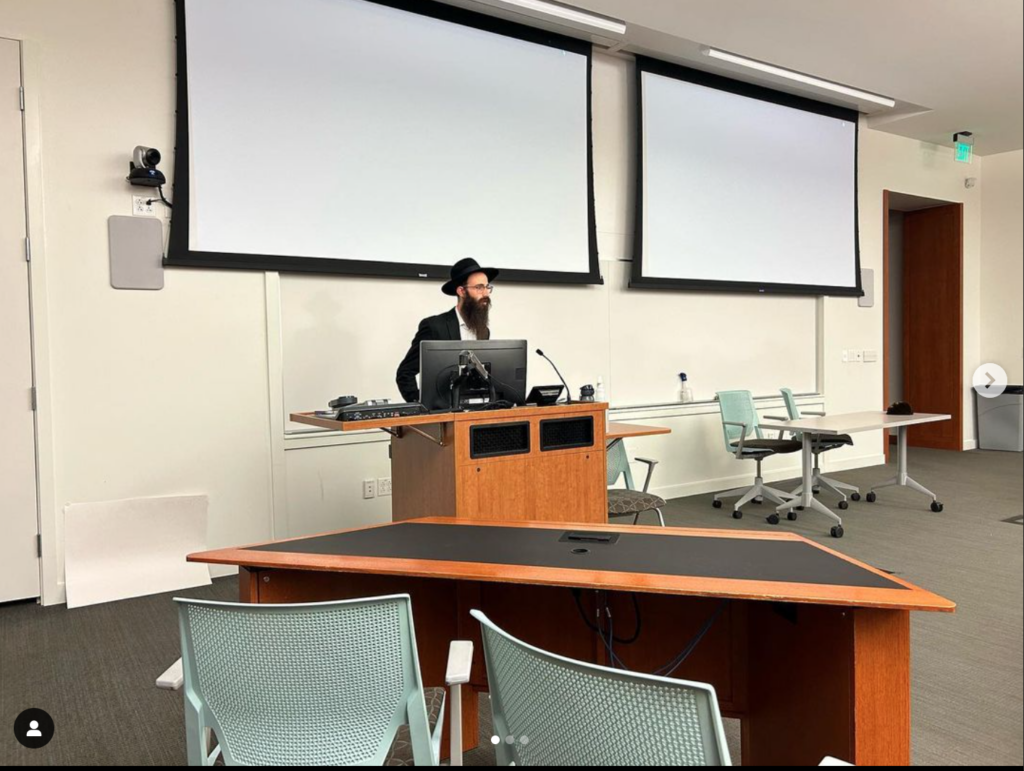
But despite what’s happening throughout the country, leaders of Wyoming’s small Jewish population — which comprises less than 1% of the state’s 580,000 residents — say they feel safe and supported by the broader community.
“If you’re fishing for controversy, it ain’t happening in Wyoming,” said Rabbi Moshe Halfon, leader of the Mt. Sinai Congregation in Cheyenne and the Jewish representative to the Wyoming Interfaith Network.
Though he noted there’s still “lots of grief” stemming from the violence overseas, Halfon told the Wyoming Truth he’s found the state’s Jews feel “very, very supported by their gentile neighbors, and very, very peace oriented.”
“We did worry about security; we always are,” Halfon added. “But we have not found that we need to do anything more than we normally have.”
Shortly after the attack, religious leaders in Jackson organized an interfaith prayer vigil at the town square that drew significant numbers of Jews and Christians from the local community.
“As many of you know, I’m not Jewish, but I cannot imagine the pain within your communities,” Vice Mayor Arne Jorgensen told attendees. “Please know that your town council, the town of Jackson supports you, cares for you, as we do with all of our community when we’re in pain.”
A similar event was held on Oct. 9 in Cheyenne, where religious leaders and community members gathered on the steps of the state capitol.
“We’re here not because we have solidarity with the state of Israel or the nation of America, but because there are people, real people, in turmoil,” said Rev. Elizabeth Mount, leader of the local Unitarian Universalist Church.
Before the Cheyenne event took place, Gov. Mark Gordon ordered the state’s flags to fly at half-staff to honor the Israeli victims of Hamas’ attack.
“Wyoming stands firmly by our ally Israel as she defends her people from the cowardly attacks of Hamas,” Gordon said in a statement at the time. “We vehemently condemn the horrendous actions of these terrorists.”
University of Wyoming remains quiet
Since the recent outbreak of violence, American college campuses have become a hotbed of protest activity, leading to threats against Jews at the University of Pennsylvania and Cornell and crackdowns on pro-Palestinian student organizations at Harvard and Brandeis.
But at UW, things have remained mostly quiet. “There’s been zero talk about [the war]. Like, I haven’t witnessed anything,” Zalcman, 22, said.
Some UW faculty say the quiet is distinct from what is taking place on other campuses. Emil Eidin, a professor of secondary science education who hails from Tel Aviv, noted some of his Israeli friends who work at other universities didn’t show up to work during the first couple weeks after the Oct. 7 attack.
“They were just too afraid,” he told the Wyoming Truth. “That’s really very different from my experience. All my colleagues reached out to me asking how I am. The [University] President [Ed Seidel] reached out to me personally asking about me.”
To be sure, not everyone feels so supported.
As the Wyoming Truth previously reported, some Muslim and Arab students at UW have spoken out against what they allege is a “biased” response from university leaders towards Israel, one that failed to recognize the significant number of civilian casualties in Gaza.
“As a minority, you just feel kind of attacked, I guess, and kind of overlooked,” Muhammad Sulthon Nuruddin, a UW senior and president of the Muslim Student Association (MSA), told the Wyoming Truth in October.
And wary about what’s happening nationwide, Jewish leaders on campus are intent not to get complacent about the relative calm.
“Given the quick and alarming rise in both antisemitism and Islamophobia on college campuses, University of Wyoming Hillel is putting all of our efforts into ensuring the safety of the Jewish students at UW, as well as supporting their mental health,” a representative for the UW Hillel Board said in a statement shared with the Wyoming Truth.
Zalcman said she’s torn about the lack of campus conversations about the Israeli-Palestinian conflict: “There’s such a big part of me that wishes people knew more. But there’s also the tiny part of me that, like, needs to protect myself. Because I know that I don’t have a [Jewish] community here.”
Eidin, the science education professor, echoed Zalcman’s call for more education, noting he recently gave a talk to his School of Teacher Education colleagues about the Israeli perspective on what’s taking place.
Rabbi Yaakov Raskin, who recently moved to Laramie from Brooklyn to found the city’s first Chabad center, chalked up the lack of controversy to the Wyoming way of life.
“In Wyoming, generally, people are more interested in ‘live and let live’ than in, like, in your face kind of stuff,” Raskin told the Wyoming Truth.
Still, Raskin stressed Wyomingites should take notice of what’s happening overseas and learn from it.
“This is a fight for humanity around the world – in defense of humanity, decency, and tolerance,” he wrote in a follow-up email. “It’s not a territorial dispute over one piece of land or another.”
Eiden, too, urged for a greater understanding of what’s at stake in the conflict.
“Even what happened 6,800 miles from Wyoming still has an impact on what’s happening in Wyoming and in the U.S.,” he said. “As Americans, it’s important to know about what happens outside so far [away], [things] that actually can have a great impact on America itself.”


